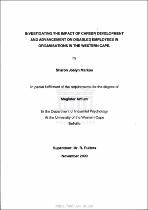Investigating the impact of career/development and advancement on 'disabler employees in organisations in the Western Cape.
Abstract
The study aims to ascertain the attitudinal disposition of disabled individuals towards their own career development and advancement. Results indicate a positive attitudinal disposition. One hundred and three physically disabled workers constituted the sample, which consisted of 48 males and 55 females. Of the sample 75 had qualifications of matric and below and 28 that of above matric. Questionnaires were distributed to one hundred and forty five subjects associated with a Network for the Disabled, with a response rate of one hundred and three. Analysis of the respondent's actual responses indicate that more than half of the matric and below respondents would like to move into higher job levels. As training is but one initiative for career development, it is important to reflect that the greater proportion of white collar and blue collar status respondents feel that the opportunity to develop their career with further training is motivating. However, only a specified total of respondents pursued this initiative. A bigger proportion of the sample specified that they have done additional training courses, where more than half of this proportion feel that to do training courses motivate them within the context of career development
and lesser proportion of them have a greater positive disposition about this. While significant associations were found between career development and further training opportunities, age was found not to have any influence on career development for this sample. Lastly, the limitations of the study are discussed with further recommendations and implications of the research findings in closure.

